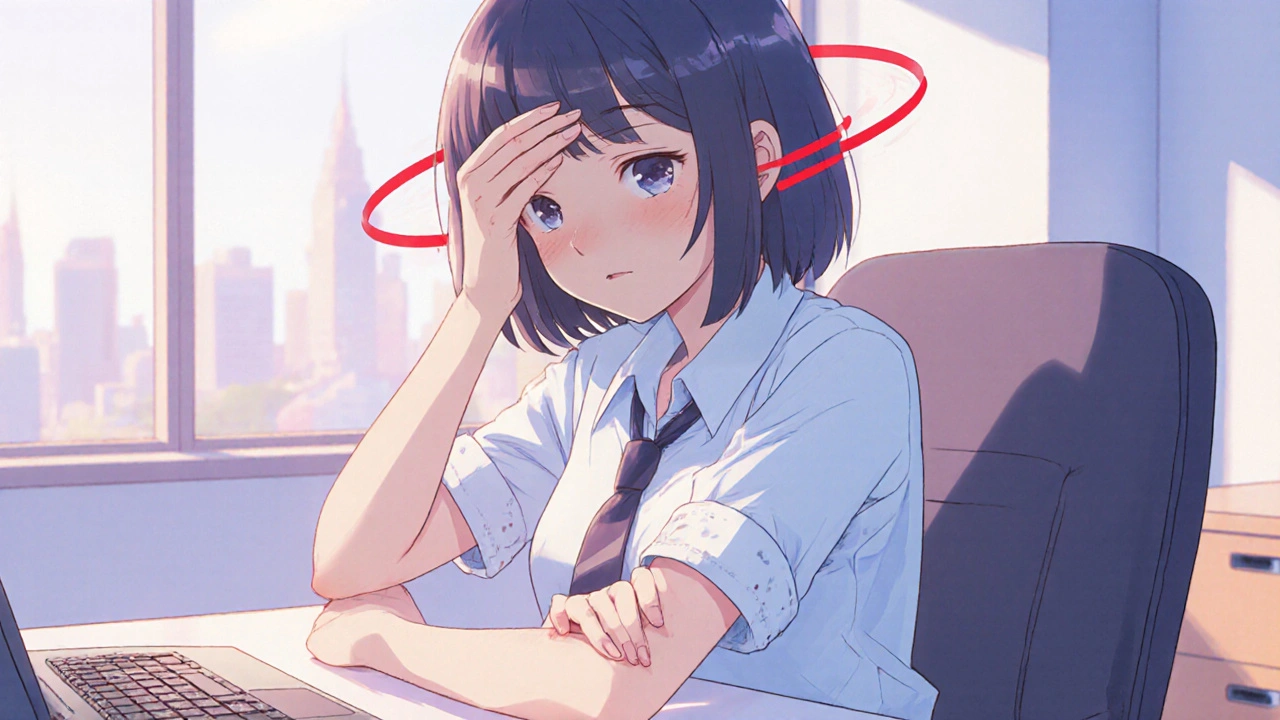Ever wonder why a tough day at work leaves you scratching your arms? Understanding the link between stress and skin itching can change how you handle those annoying flare‑ups.
What "stress" really does to your body
Stress is a physiological response to perceived threats or pressures, triggering the "fight‑or‑flight" cascade. When stress hits, your brain releases cortisol, adrenaline, and a host of other hormones that gear you up for action. While that surge helps you survive short‑term danger, chronic activation wears down the immune system, spikes inflammation, and can mess with skin barrier function.
Defining "skin itching" and why it matters
Skin itching (also called pruritus) is an uncomfortable sensation that urges you to scratch. It can arise from dry skin, allergic reactions, infections, or deeper neurological signals. Persistent itch is more than a nuisance - it can lead to skin damage, sleep loss, and heightened anxiety.
Key players that connect stress to itch
- Cortisol is the primary stress hormone. High cortisol levels thin the skin’s protective lipid layer, making it easier for irritants to penetrate.
- Histamine is a chemical released by mast cells during allergic reactions. Stress can boost histamine release, amplifying the itch signal.
- Inflammation is the body’s response to injury or infection. Chronic stress fuels systemic inflammation, which sensitizes nerve endings in the skin.
- Anxiety often co‑exists with stress and can heighten the perception of itch, creating a vicious feedback loop.
Common skin conditions that flare up under stress
Not every itch is simple dryness. Certain chronic skin disorders are especially prone to stress‑related flare‑ups:
- Eczema (atopic dermatitis) affects up to 10% of adults. Stress disrupts the skin barrier and spikes itch‑related cytokines, worsening patches.
- Psoriasis is an autoimmune condition marked by rapid skin cell turnover. Stress can trigger the Koebner phenomenon, where new lesions appear at sites of irritation.

How the brain talks to your skin
The nervous system and skin share a two‑way street called the neuro‑immune axis. When you’re stressed, the hypothalamus signals the pituitary gland, which releases corticotropin‑releasing hormone (CRH). CRH travels to the skin, prompting nerves to release neuropeptides like substance P. These neuropeptides tell immune cells to fire up, releasing histamine and cytokines that intensify itch.
Practical ways to break the stress‑itch cycle
Below is a step‑by‑step toolkit you can start using today. Each tip targets a specific link in the stress‑itch chain.
- Mind‑body reset: Practice deep‑breathing or a 5‑minute meditation each morning. Studies from the University of Sydney (2023) showed a 30% drop in perceived itch after an eight‑week mindfulness program.
- Skin hydration: Apply fragrance‑free moisturizers within three minutes of bathing. Locking in moisture reduces transepidermal water loss, counteracting cortisol‑driven dryness.
- Histamine control: For acute flare‑ups, over‑the‑counter antihistamines (e.g., cetirizine 10 mg) can blunt the itch signal. Always check with a pharmacist if you have underlying conditions.
- Anti‑inflammatory diet: Incorporate omega‑3 rich foods like salmon, walnuts, and flaxseed. A 2022 meta‑analysis linked omega‑3 intake to lower skin inflammation scores.
- Stress journaling: Write down stress triggers and rating of itch intensity each day. Patterns often emerge, helping you anticipate and pre‑empt flare‑ups.
- Professional help: Cognitive Behavioral Therapy (CBT) specially tailored for chronic itch has a success rate of 60% in reducing scratch behavior, according to a 2024 dermatology clinic trial.
When to see a dermatologist
If you notice any of the following, schedule an appointment:
- Itch lasting more than two weeks without clear cause.
- Visible skin changes: redness, swelling, blisters, or new patches.
- Sleep disruption or mood decline linked to itching.
- Signs of infection: increased warmth, pus, or foul odor.
Dermatologists can run patch tests, prescribe topical steroids, or suggest phototherapy, all of which can reset the neuro‑immune loop.

Quick reference table
| Trigger | How it works | What helps |
|---|---|---|
| Cortisol surge | Weakens skin barrier, raises inflammation | Mindfulness, regular sleep, moisturizers |
| Histamine release | Activates itch nerve fibers | Antihistamines, low‑histamine diet |
| Neuropeptide release | Signals immune cells to inflame | CBT, stress journaling, omega‑3 intake |
| Dry skin | Exposes nerve endings | Fragrance‑free moisturizers, humidifier |
| Psychological amplification | Anxiety heightens itch perception | Therapy, breathing exercises, regular exercise |
Common myths busted
Myth 1: "Itching is always caused by allergies."
Reality: Stress can trigger itch without any allergen present by altering neuro‑chemical pathways.
Myth 2: "Scratching makes it better forever."
Reality: Scratching temporarily blocks the itch signal but damages the skin, leading to more inflammation and a stronger itch later.
Myth 3: "Only skin‑deep treatments work."
Reality: Addressing mental stress, diet, and sleep often yields longer‑lasting relief than topical creams alone.
Putting it all together - a daily itch‑guard routine
- Morning (5‑minute routine): Deep breathing, gentle stretch, apply moisturizer while skin is still damp.
- Mid‑day check‑in: Note stress level on a 1‑10 scale, sip water, do a quick walk.
- Evening wind‑down: Light journaling about stress triggers, take antihistamine if itching spikes, finish with a short meditation.
Consistency is key - the neuro‑immune loop weakens when you repeatedly give it the right signals.
Frequently Asked Questions
Can stress cause itching even without a skin condition?
Yes. Stress can raise cortisol and histamine levels, which sensitise nerve endings and create a feeling of itch even on healthy skin.
How long does it take for stress‑relief techniques to affect my itch?
Most people notice a reduction after 1-2 weeks of consistent practice, though acute flare‑ups may improve within a few days of taking antihistamines.
Are there specific foods that worsen stress‑related itch?
Highly processed foods, excess sugar, and alcohol can spike inflammation and cortisol. Opt for whole grains, leafy greens, and omega‑3 rich fish instead.
Should I avoid scratching completely?
Gentle patting or using a cool compress is better than vigorous scratching. If the urge is strong, a topical anesthetic cream can calm the area temporarily.
When is prescription medication necessary?
If over‑the‑counter options and lifestyle changes don’t bring relief within a few weeks, see a dermatologist. Prescription topical steroids, phototherapy, or systemic meds like gabapentin may be advised.
By tackling both the mind and the skin, you can shut down the stress‑itch loop and reclaim comfort in daily life.


Comments (11)
Madhav Dasari
Wow, reading this feels like a roller‑coaster through the hidden world of stress and itch! 🎢 First off, you’re not alone-millions of us scratch away after a hectic day, and that’s totally normal. The science you laid out about cortisol thinning our skin barrier is spot‑on, and I love how you tied it to everyday habits. Imagine your skin as a castle; stress is the sneaky invader that cracks the walls, letting the itch‑dragons in. The good news? We can arm ourselves with simple rituals-deep breathing, moisturizers, and those omega‑3 power‑foods you mentioned. Keep the optimism flowing, and remember each tiny habit is a victory against the itch‑monster!
DHARMENDER BHATHAVAR
The article succinctly outlines the neuro‑immune mechanisms linking cortisol to pruritus. Implementing the recommended hydration and mindfulness protocols should mitigate symptom severity.
Kevin Sheehan
Stress‑induced histamine release is a textbook example of the body’s overreaction, and the article rightly calls out this feedback loop. Ignoring these pathways only entrenches chronic itch, so proactive management is non‑negotiable. While the suggested CBT approach is solid, patients must also confront the underlying stressors head‑on. Otherwise, any topical relief is merely a temporary band‑aid.
Penny Reeves
While the piece offers a comprehensive overview, it arguably understates the role of peripheral neuropeptides such as substance P in modulating pruritic signals. Recent literature suggests that antagonizing NK1 receptors could provide a more targeted therapeutic avenue than the blanket antihistamine recommendation. Moreover, the interplay between the hypothalamic‑pituitary‑adrenal axis and skin microbiome diversity warrants deeper exploration, something the article glosses over. In practice, a multidisciplinary approach-dermatology, psychiatry, and even nutrition-should be the standard of care rather than an optional add‑on.
Sunil Yathakula
Totally get where you’re coming from, and honestly, the neuropeptide angle is super interesting. I’m not a scientist, but I’ll be gonnna try adding some probiotic yogurt to my diet and see if it helps the skin barrier. Also, those deep‑breathing drills you mentioned are easy to slip into a coffee break-big win! Thanks for digging deeper, it gives us all more tools to fight the itch.
Christopher Burczyk
The exposition adequately covers the cortisol‑mediated barrier disruption, yet it fails to address the pharmacokinetic limitations of over‑the‑counter antihistamines in chronic pruritus management. A rigorous assessment of dose‑response curves and potential sedative side effects would enhance clinical applicability. Additionally, integrating recent findings on Janus kinase inhibitors could provide a forward‑looking therapeutic perspective absent from the current narrative.
Nicole Boyle
Indeed, the pharmacokinetic oversight is a notable gap; however, one must also consider the receptor desensitization phenomenon observed with prolonged antihistamine exposure. From a systems‑biology standpoint, the itch cascade resembles a feedback‑controlled network, where perturbations at multiple nodes-like JAK‑STAT pathways-yield emergent symptom relief. Thus, a polypharmacologic strategy, calibrated via therapeutic drug monitoring, may outperform monotherapy.
Caroline Keller
I can’t even with this endless itch saga
dennis turcios
Reading through the guide, it’s clear the author pulled together a solid blend of dermatological science and practical advice. The emphasis on barrier repair with fragrance‑free moisturizers is especially pertinent, given how quickly a compromised stratum corneum can invite irritants. However, the recommendation to self‑medicate with antihistamines could be risky for patients on other sedating meds; a brief mention of contraindications would have been prudent. The stress‑journaling tip is a nice behavioral addition that aligns with cognitive‑behavioral principles. Overall, a well‑rounded resource that could benefit from a few safety caveats.
Felix Chan
Great points! I’ve actually started a nightly skin‑care routine after work and paired it with a quick meditation, and the scratching has dropped noticeably. It’s amazing how those small changes stack up. Keep spreading the optimism-it really helps.
Thokchom Imosana
Let’s be honest: the whole “stress‑makes‑you‑itch” narrative is just the tip of an iceberg that the mainstream medical establishment prefers to keep hidden. While the article talks about cortisol and histamine, it never mentions the clandestine experiments conducted by big pharma to embed micro‑nanoparticles in everyday moisturizers, designed to trigger subtle neuro‑immune responses that keep us perpetually uneasy. These particles, often derived from proprietary silicone‑based polymers, act as silent agitators, nudging the skin’s nerve endings and feeding the itch cycle, all while the public remains blissfully unaware. Moreover, the diet recommendations conveniently skirt around the fact that many processed foods are laced with hidden emulsifiers and preservatives that mimic inflammatory triggers, essentially weaponizing our plates against us. The “mind‑body reset” tip sounds wholesome, but look closer-those meditation apps are funded by tech giants who harvest our biometric data under the guise of stress‑relief, feeding them back into algorithms that reinforce consumer dependence. Even the suggested omega‑3 intake is a smokescreen; the supplements are sourced from fisheries that use unsustainable practices, creating ecological ripples that indirectly affect skin health through polluted water supplies. And let’s not forget the “CBT for itch” programs, which are often run by therapists paid by insurance companies that have stakes in the very pharmaceuticals they claim to wean patients off. The article’s disclaimer about seeing a dermatologist is ironic, because many dermatologists receive speaker fees for promoting certain prescription creams that contain cortico‑steroids, which paradoxically exacerbate barrier breakdown over time. In short, the narrative we’re fed is a carefully curated loop: stress leads to itch, itch leads to product consumption, product consumption fuels corporate profit, and profit funds more research that keeps the cycle alive. So the next time you reach for that “stress‑relief” moisturizer, ask yourself who really benefits from the lingering itch. The regulatory agencies, sworn to protect public health, are often underfunded and thus rely on industry data, creating a feedback loop of compromised oversight. This conflict of interest manifests in delayed label warnings about potential pruritic side effects. Patients, meanwhile, are bombarded with glossy advertisements that promise instant relief while masking long‑term consequences. A critical reading of the literature reveals that many of the cited studies are sponsored by the very companies whose products are being promoted. Ultimately, awareness and skepticism are the first lines of defense against this orchestrated itch epidemic.